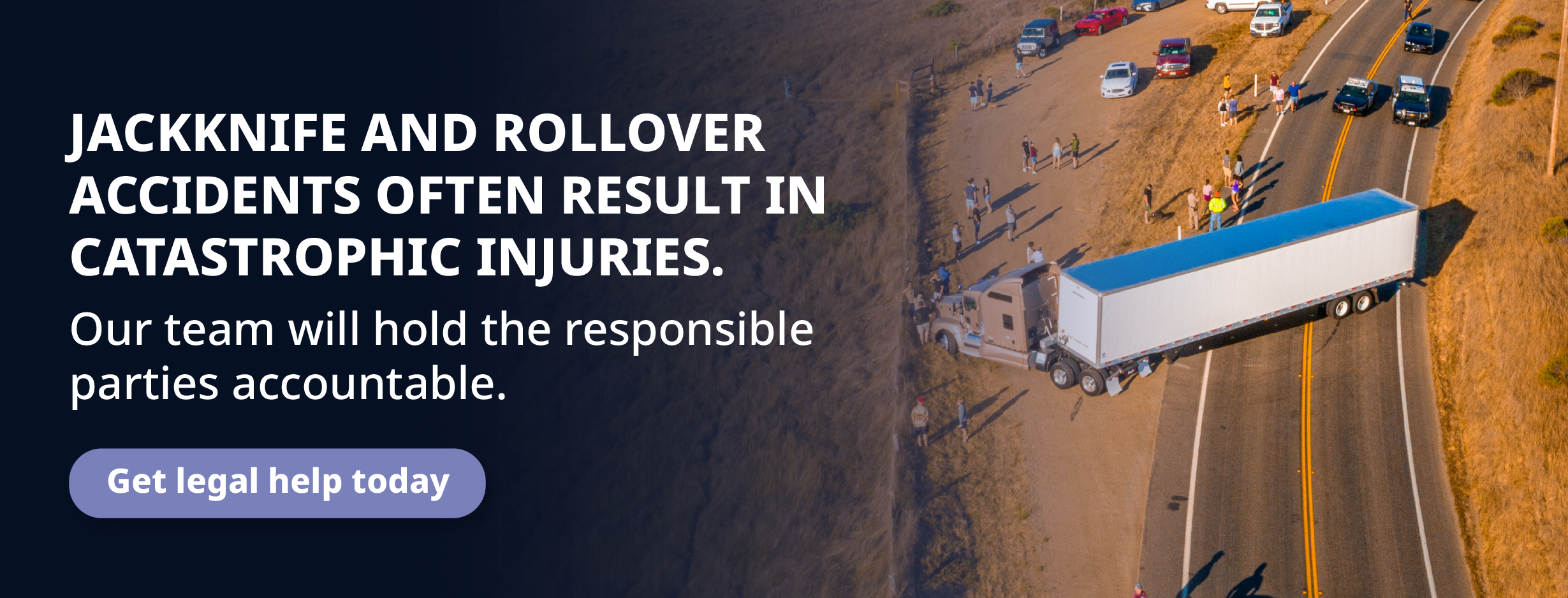¡Hablamos Español!
Jackknife and rollover truck accidents are among the most dangerous and devastating types of crashes on Utah’s highways. These accidents often result in multi-vehicle collisions, catastrophic injuries, and extensive property damage, leaving victims facing overwhelming medical expenses and legal challenges.
Jackknife accidents occur when a truck’s trailer swings out at an angle, while rollovers happen when a truck loses stability and tips over, blocking multiple lanes of traffic. Due to the sheer size and weight of commercial trucks, these crashes can have life-altering consequences for those involved.
At Flickinger Boulton Robson Weeks, our experienced Utah truck accident lawyers understand the complexities of these cases and are committed to helping victims hold negligent truck drivers and companies accountable. If you or a loved one has been injured in a jackknife or rollover accident, contact us today to discuss your legal options.

Jackknife and rollover accidents involving large commercial trucks are some of the most catastrophic crashes on Utah’s roads. These accidents not only put truck drivers at risk but also endanger other motorists.
While various factors contribute to these types of accidents, they often involve a combination of driver error, mechanical failure, road conditions, and improper cargo loading.
Understanding these causes can help injured victims determine liability and seek compensation.
A jackknife accident occurs when a truck’s trailer swings outward, forming an angle with the cab that resembles a folding pocketknife. This happens when the trailer loses traction and moves independently of the cab, making it impossible for the driver to regain control.
Several factors contribute to jackknife accidents, including:
Hard braking, especially on slippery roads, can cause the trailer’s wheels to lock up while the cab continues moving forward.
Taking sharp turns at high speeds can make the trailer swing out of alignment.
Rain, snow, and ice reduce traction, increasing the risk of jackknifing when a driver loses control.
Improperly loaded cargo can shift during transit, throwing off the truck’s balance and leading to a jackknife situation.

A rollover accident occurs when a truck tips onto its side or completely overturns. These crashes are often deadly, as they can involve multi-vehicle collisions and widespread damage.
Some of the leading causes of rollover accidents include:
Truck accidents aren’t always the result of driver mistakes; mechanical issues and maintenance failures can also play a significant role. Defective brakes, worn-out tires, and steering system malfunctions all contribute to jackknife and rollover accidents.
Trucking companies and drivers are responsible for maintaining their vehicles and ensuring they meet federal safety standards. When they fail to do so, they may be held liable for resulting crashes.
If you or a loved one has been injured in a jackknife or rollover truck accident, Flickinger Boulton Robson Weeks is here to help. Our experienced Utah truck accident lawyers can investigate the crash, determine liability, and fight for the compensation you deserve. Contact us today to discuss your case and take the first step toward justice.
Truck rollover accidents are some of the most severe crashes on Utah’s highways, often resulting in devastating injuries and significant property damage. While driver behavior and mechanical issues play a role in these accidents, road conditions can also be a major contributing factor.
Poorly maintained roads, hazardous weather, and sudden changes in terrain can all increase the risk of a truck tipping over. Understanding these dangerous conditions can help both truck drivers and other motorists stay alert and reduce the likelihood of a rollover accident.
Rain, snow, and ice create hazardous conditions that reduce traction and increase the likelihood of a truck rollover. When a truck’s tires lose grip on the road, the driver may struggle to maintain control, especially when making turns or braking suddenly. Black ice is particularly hazardous because it is nearly invisible, causing unexpected skids that can lead to rollovers.
Truck drivers often move toward the shoulder of the road to avoid collisions or allow emergency vehicles to pass. However, if the shoulder is uneven, narrow, or made of loose gravel, the truck’s tires may sink or shift, throwing off the vehicle’s balance. This can result in a rollover, particularly if the driver overcorrects when trying to return to the main roadway.
Curved roads and steep inclines require careful handling, particularly for large commercial trucks carrying heavy loads. Taking a curve too fast or failing to adjust speed on a downhill slope can cause a truck to tip over due to excessive centrifugal force. Some of the most dangerous areas include:
Damaged roads with potholes, cracks, or sudden drop-offs can destabilize a truck, particularly if the driver is traveling at high speeds. Hitting a deep pothole may cause a sudden shift in weight distribution, increasing the risk of a rollover. Additionally, uneven pavement can make it harder for a truck’s tires to maintain full contact with the road, leading to a loss of control.
Truck drivers must be extra cautious when navigating hazardous road conditions. Reducing speed, maintaining a proper following distance, and avoiding sudden maneuvers can help prevent rollovers. If you or a loved one has been injured in a truck rollover accident caused by dangerous road conditions, Flickinger Boulton Robson Weeks can help you seek compensation for your losses. Contact us today for a free consultation.
Jackknife and rollover accidents are among the most dangerous types of truck crashes, often resulting in severe injuries, fatalities, and extensive property damage. Determining liability in these accidents can be complex, as multiple parties may share responsibility.
Factors such as driver negligence, improper cargo loading, mechanical failures, and hazardous road conditions all play a role in these crashes. Understanding who may be liable is crucial for victims seeking compensation for medical expenses, lost wages, and other damages.
Truck drivers are responsible for operating their vehicles safely and following state and federal trucking regulations. However, reckless or negligent behavior can significantly increase the risk of a jackknife or rollover accident.
Common examples of driver negligence include:
If driver negligence is a factor, the truck driver and their employer may be held accountable for the resulting damages.
Trucking companies have a legal duty to ensure their drivers are adequately trained, and their vehicles are in safe working condition. A company may be liable for a jackknife or rollover accident if they:
When a trucking company’s negligence contributes to an accident, they may be held financially responsible for injuries and damages.
Improperly loaded or unbalanced cargo is a major cause of jackknife and rollover accidents. If a truck’s load shifts unexpectedly, it can throw off the vehicle’s stability, making it difficult to control. Cargo loading companies or the trucking company itself may be held liable if they:
Trucks must be regularly inspected to ensure they meet safety standards. If a mechanical failure, such as brake failure or tire blowouts, causes a crash, multiple parties may be liable, including:
Poorly maintained roads or dangerous conditions sometimes contribute to jackknife and rollover accidents. If a road defect, such as large potholes, inadequate signage, or uneven pavement, played a role in the crash, a government agency responsible for road maintenance may be held liable. However, suing a government entity involves specific legal challenges, including strict deadlines for filing claims.
Being involved in a jackknife or rollover truck accident can be a frightening and overwhelming experience. These crashes often lead to severe injuries and significant property damage, making it essential to take the right steps in the aftermath.
Whether you are a truck driver, passenger, or another motorist involved in the accident, knowing what to do can protect your health, legal rights, and potential compensation.
Your safety and well-being should be the top priority. Even if you do not feel injured immediately, some injuries, such as whiplash or internal trauma, may not show symptoms right away. Seeking medical attention ensures that any injuries are diagnosed and treated promptly.
It is crucial to contact law enforcement as soon as possible. A police report will document important details about the crash, including witness statements and initial fault determinations. This report can serve as valuable evidence when filing an insurance claim or lawsuit.
If it is safe to do so, collect as much evidence as possible to support your case. Important steps include:
Take photos of the accident scene, vehicle damage, road conditions, and visible injuries.
Obtaining contact information from witnesses who saw the crash.
Noting weather conditions, traffic signs, and any potential hazards that may have contributed to the accident.
Report the accident to your insurance provider as soon as possible. Be factual, but avoid admitting fault or giving detailed statements before consulting a knowledgeable Utah truck accident lawyer.
Truck accident claims can be complex, involving multiple liable parties. A skilled Utah truck accident lawyer can help protect your rights, gather crucial evidence, and fight for the compensation you deserve.